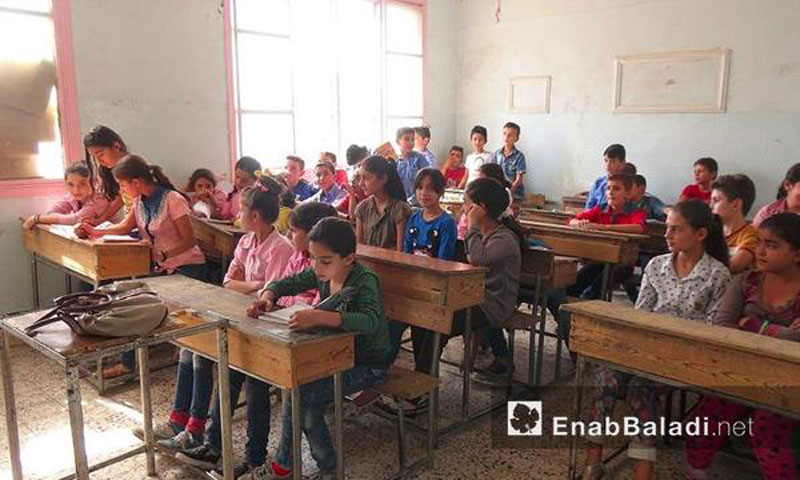



Enab Baladi – Qamishli
The self-government administrative institutions have imposed restrictions on the educational system in the north-eastern region that is under their control. In the last few days, they have issued a decree to close all private educational institutions in all educational levels in the city of Hasaka and its countryside, as part of a plan to impose their “rules” both in relation to the number of schools they run or the educational curricula they said they will introduce in the academic year 2017-2018.
According to the circular, “following the decree that was issued by the Education Commission in al-Jazira province to close all private institutes, and the ban on paid private lessons, all teachers should be informed that they have to abide by this decree and make sure it is appropriately executed. In case of any transgression, legal actions would be taken in the Public Prosecution.
Samira Haj Ali, the joint head of the Education Commission, claimed in a press announcement that “This decree was first issued on June 1 to be strictly implemented and to ban all training sessions everywhere. It might take several days until all of them are closed.”
“The schools of the Syrian region of al-Jazira have been subjects to destruction for seven years now either in relation to discipline, educational content or teacher attendance, which has made private institutions a key terminus for education”, said Mohammed Saleh Abdu, head of the Education Commission in al-Jazira province.
He also clarified in an interview with Enab Baladi that “Private lessons have become so common and widespread, and education has turned into a popular business that many teachers who turned their houses into classrooms have taken advantage of. This is the factor that has pushed the self-government administration to take such decision.”
According to Saleh, “The Education Comission saw that the educational process should be put again on the right track rather than being left as it is higgledy-piggledy moving in all directions.” According to him, “in the upcoming period, the Commission will grant and some free-of-charge private lessons the students might need at its own expense.”
Because of the bipolar control over Hasakah province, and because each group tries to impose its own laws on citizens in various fields, some students in the province refuse to enroll in schools that are run by the Education Commission of the self-government administration, after it has imposed curricula that students were not familiar with, during the past academic year.
Contrary to what happened before, the imposition of curricula at that time caused a problem for many students in Hasakah. Some of them went to private schools, and others preferred to be kept without education.
The commission’s official, Haj Ali, said that the self-government administration would find an alternative to the private education centers, noting that “in 2017-2018 all schools will be administered by the Education Commission in Hasakah province.”
She further explained: “the institutes or private courses that we will close are mainly those of the baccalaureate courses, and the reason is that, next year, the curriculum would be issued in the Kurdish language until the ninth grade, and with follow the self-government administration curriculum.”
Saleh confirmed what Haj Ali mentioned, and pointed out that “the quality of the curriculum will be as it previously was in the baccalaureate level.” He pointed out that the Commission has “A comprehensive educational plan. Education curricula of the democratic self-government administration will be introduced and secondary schools will be run by it”.
He called on “all teachers to understand that this decision is actually the wisest, and that it will put education back on track again.”
Moving on to the private institutes, Enab Baladi tried to contact those who are in charge of them, but they absolutely refused to talk about the decree. They said they were again trying to contact the self-government administration hoping that it would reconsider its decision.
Despite the lack of students in self-government schools, it carries on training teachers to teach following their own curricula. According to sources that are close to the self-government administration, it did actually train 600 people by the end of 2016 to teach in its schools.
In an previous interview with one of the trainees (who refused to reveal his name), he clarified that he is having a training with his colleagues in Rmelan on the curriculum that is proposed by the self-government administration. He pointed out that each trainee will get a certificate that will allow him to teach in all the schools that are run by the Education Commission.
What causes anxiety among parents the fact that most of the trainees do not have academic certificates which allow them to attend the training sessions, and most of them hold preparatory and secondary school certificates, according to what residents of Hasaka and its countryside have observed.
Bassem Meshkini, a resident of the countryside of Hasaka, said that two people from the village he lives in attended the training session in Rmelan. He insisted, “I know these two people very well, and they have only studied until the sixth grade.” He also wondered, “What kind of education will these two people provide for students?” Describing what is happening as “unfair to the student and to his family as well.”
In the same vein, and adding to the negative reviews of the decree, the Kurdish academic scholar, Farid Saadoun, criticized the self-government administration, considering that the Education Commission decision to close private institutes is to put an end to students’ hope to pursue their education.
He posted on Facebook, “You have the right to teach your children in private educational and training centers and send them to private universities as long as you can afford the costs, and public schools and universities are to carry on doing their job as best as they can.”
if you think the article contain wrong information or you have additional details Send Correction